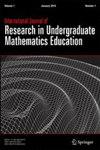通过以学生为中心的方法比较数学与其他学科之间的跨学科联系
IF 1.2
Q2 EDUCATION & EDUCATIONAL RESEARCH
International Journal of Research in Undergraduate Mathematics Education
Pub Date : 2023-02-24
DOI:10.17583/redimat.10178
引用次数: 0
摘要
在一些欧洲国家,探究性学习(IBL)在中小学数学教育中越来越流行,特别是在与科学相关的内容中。另一方面,基于问题的学习(PBL)和基于项目的学习(PjBL)在数学、科学、技术、工程(STEM)和其他高等教育领域有着更悠久的历史。在介绍了这三种以学生为中心的跨学科方法之间的理论异同之后,我们回顾了它们在数学教育中的应用。我们选取了n=112篇高质量的研究文章,分析了IBL、PBL或PjBL在数学中的应用,以及它与其他学科的跨学科联系、教育水平、研究方法类型、研究设计和每项研究的参与者。基于这些特点,我们确定了数学教育方法之间的差异。最后,对实验研究的子样本进行了详细的检查,其中效应大小是或可以测量的,描述了目标方法之间跨学科联系的差异,并指出数学教育中仍然缺少什么样的研究。本文章由计算机程序翻译,如有差异,请以英文原文为准。
Comparison of Interdisciplinary Connections between Mathematic and other Subjects through Student-centred Approaches
In some European countries inquiry-based learning (IBL) has become popular in primary and secondary mathematics education, especially for science-connected content. On the other hand, problem-based learning (PBL) and project-based learning (PjBL) have a longer history in mathematics, science, technology, engineering (STEM) and in some other fields in higher education. After presenting the theoretical similarities and differences among these three interdisciplinary student-centred approaches, we review the use of them in mathematics education. We analyse a selection of n=112 high quality research articles about the use of IBL, PBL or PjBL in mathematics, and its interdisciplinary connection with other subjects, level of education, type of research method, research design and participants for each study. Based on these characteristics, we identify the differences between the approaches in mathematics education. Finally, detailed examination of a subsample of experimental studies, where effect size is or can be measured, describes differences in interdisciplinary connections between the target approaches and indicate what kind of studies are still missing in mathematics education.
求助全文
通过发布文献求助,成功后即可免费获取论文全文。
去求助
来源期刊

International Journal of Research in Undergraduate Mathematics Education
EDUCATION & EDUCATIONAL RESEARCH-
CiteScore
2.90
自引率
20.00%
发文量
41
期刊介绍:
The International Journal of Research in Undergraduate Mathematics Education is dedicated to the interests of post secondary mathematics learning and teaching. It welcomes original research, including empirical, theoretical, and methodological reports of learning and teaching of undergraduate and graduate students.The journal contains insights on mathematics education from introductory courses such as calculus to higher level courses such as linear algebra, all the way through advanced courses in analysis and abstract algebra. It is also a venue for research that focuses on graduate level mathematics teaching and learning as well as research that examines how mathematicians go about their professional practice. In addition, the journal is an outlet for the publication of mathematics education research conducted in other tertiary settings, such as technical and community colleges. It provides the intellectual foundation for improving university mathematics teaching and learning and it will address specific problems in the secondary-tertiary transition. The journal contains original research reports in post-secondary mathematics. Empirical reports must be theoretically and methodologically rigorous. Manuscripts describing theoretical and methodological advances are also welcome.
 求助内容:
求助内容: 应助结果提醒方式:
应助结果提醒方式:


